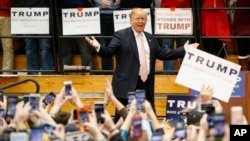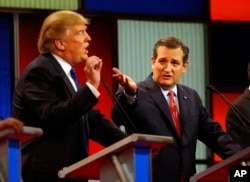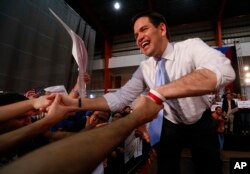It's something that has not happened in decades. If it does happen this year, one leading presidential candidate, Texas Senator Ted Cruz, predicted voters would respond with a "revolt." But most analysts now agree: A contested political convention may be the only way to stop Republican presidential front-runner Donald Trump from winning the party's nomination.
A contested convention occurs when no presidential candidate wins a majority of delegates during the primaries and caucuses that take place in each state. Instead, delegates attending the party's national convention cast ballots for whomever they want, and continue to vote until a candidate wins a majority.
For weeks, it appeared the outspoken billionaire Trump was on the path toward securing the 1,237 delegates needed to win the nomination outright. As a result, Republican Party leaders who were repulsed by the idea of Trump as their nominee urged low-polling candidates to drop out of the race so the party could coalesce around a single non-Trump candidate.
But after Trump did worse than expected recently in several states, and no clear alternative to him emerged, that strategy changed. Many are now calling for the remaining candidates to stay in the race, hopeful that dividing the vote will deny Trump a delegate majority and force a convention battle from which a more establishment candidate can emerge.
The strategy is risky, and it is rare.
The last time a major national party convention opened without a clear winner was 1976, when Gerald Ford had a lead, but had not captured a majority of the delegates. It is also controversial, since the outcome likely will not reflect the decision of voters and is vulnerable to backroom deals between party leaders.
A contested convention could either define or destroy the Republican Party, according to James Russell Muirhead, a professor of government at Dartmouth University. By choosing a candidate who does not have the most support from voters, delegates risk "imposing a definition on the party independent of what the people who participated in the nomination process decided," he told VOA.
"They could also destroy the Republican Party by alienating a large number, a third to a half of people who participated in the primaries and caucuses," Muirhead added.
Trump: Contested convention 'unfair'
The candidate who stands to lose the most in such a scenario is Trump, who despite recent setbacks still has a commanding delegate lead. On Tuesday, Trump said it would be "pretty unfair" to have a contested convention.
"I think that whoever's leading at the end should sort of get it,” Trump told Fox News. “I would think so. That's the way democracy works. I don't know that that's going to happen, but I'll tell you there will be a lot of people that will be very upset if that doesn't happen."
Trump's rivals are mixed on whether a contested convention, also known as a brokered convention, is the best way forward.
Cruz, who now appears to be the strongest second-place option, last week flatly rejected the idea, saying instead that he intends to beat the New York businessman at the ballot box.
Cruz predicts revolt
Last week, Cruz even went so far as to predict that voters would respond to a brokered convention by revolting.
"(If) we go to a brokered convention ... the D.C. power brokers will drop someone in who is exactly to the liking of the Washington establishment. If that were to happen, we will have a manifest revolt on our hands all across this country," Cruz told an annual gathering of conservatives outside Washington.
Ohio Governor John Kasich, who is in a distant fourth place both in the delegate count and in most opinion polls, has acknowledged that a contested convention is the only possible way for him to win the nomination. Florida Senator Marco Rubio's campaign has also been reportedly planning for a brokered convention.
More moderate candidate?
Both Kasich and Rubio typify the more moderate, establishment-type candidate that has traditionally dominated the Republican Party. If there is a contested convention, many analysts predict that someone like this will emerge as the nominee.
But Steffen Schmidt, political science professor at Iowa State University, isn't so sure, saying Republican delegates could be just as divided as Republican voters.
"There are at least three, maybe even four or five, different currents within the stream of the Republican Party," Schmidt told VOA. "And if it were a brokered convention, it isn't clear which piece of the party could actually wrangle a majority out of this."
Another intriguing option: Delegates could choose to nominate someone not even currently in the race. Mitt Romney, the party's last presidential candidate, who lost to President Barack Obama in 2012, recently refused to rule out becoming the nominee at a brokered convention.
Whoever emerges as the nominee, he or she will likely be severely damaged and will face a tough challenge in defeating the Democratic nominee, according to Muirhead, the Dartmouth professor.
"This is a formula for nominating someone who's going to be very, very weak in the general election, who is going to lack the support of a very large part of the party," he said.






